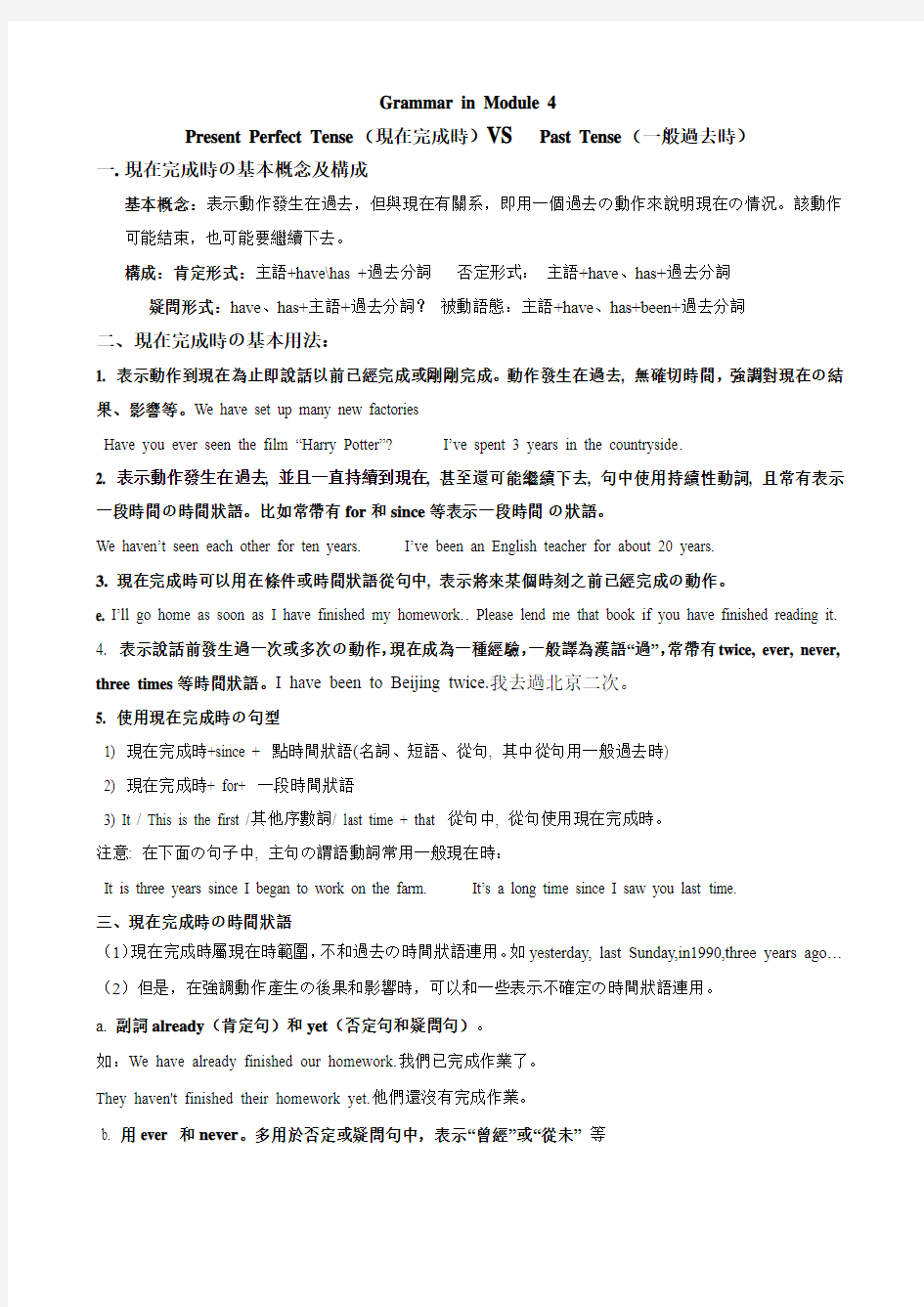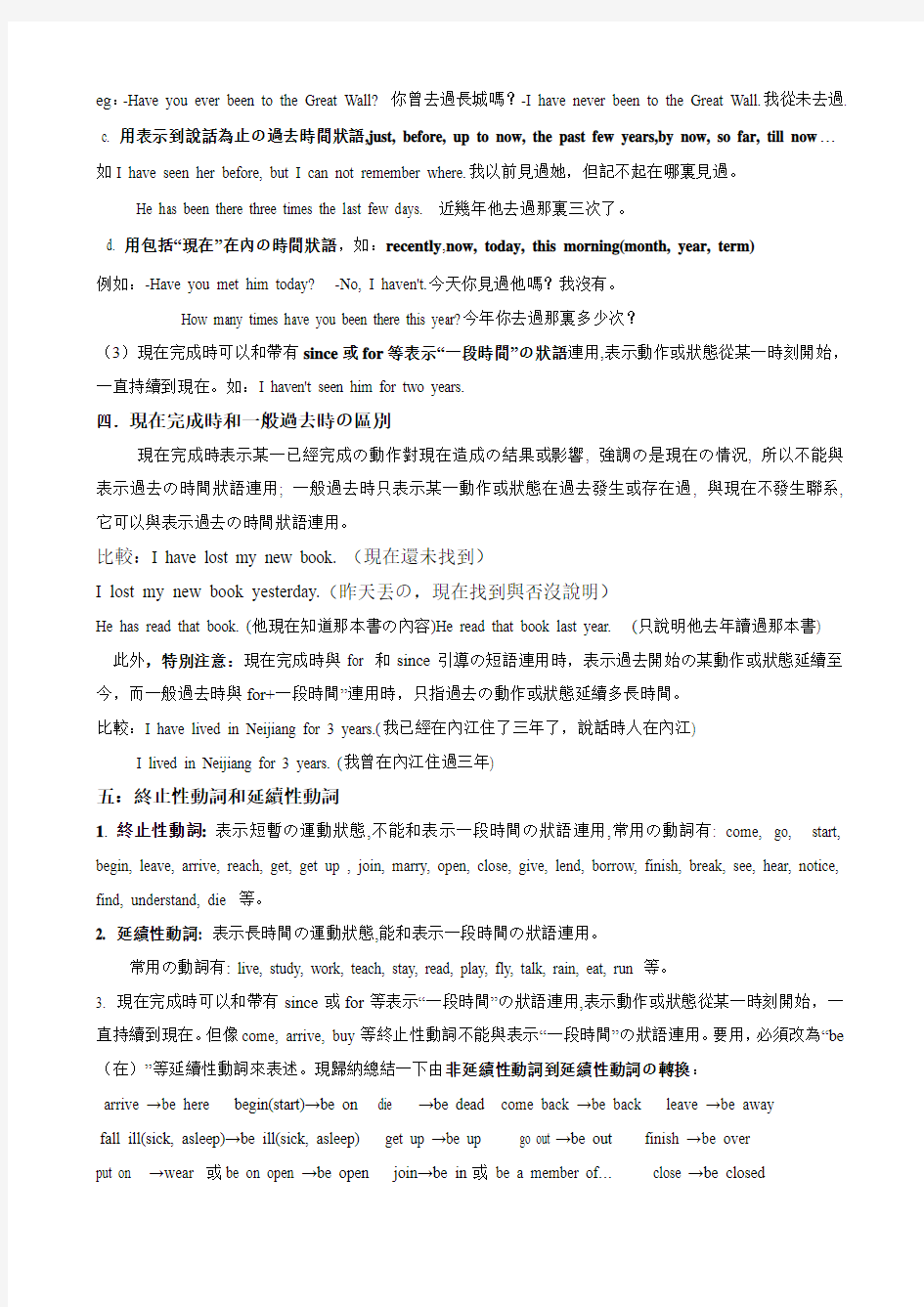

Grammar in Module 4
Present Perfect Tense(現在完成時)VS Past Tense(一般過去時)
一.現在完成時の基本概念及構成
基本概念:表示動作發生在過去,但與現在有關系,即用一個過去の動作來說明現在の情況。該動作可能結束,也可能要繼續下去。
構成:肯定形式:主語+have\has +過去分詞否定形式:主語+have、has+過去分詞疑問形式:have、has+主語+過去分詞?被動語態:主語+have、has+been+過去分詞
二、現在完成時の基本用法:
1. 表示動作到現在為止即說話以前已經完成或剛剛完成。動作發生在過去, 無確切時間,強調對現在の結果、影響等。We have set up many new factories
Have you ever seen the film “Harry Potter”?I’ve spent 3 years in the countryside.
2. 表示動作發生在過去, 並且一直持續到現在, 甚至還可能繼續下去, 句中使用持續性動詞, 且常有表示一段時間の時間狀語。比如常帶有for和since等表示一段時間の狀語。
We haven’t seen each other for ten years.I’ve been an English teacher for about 20 years.
3.現在完成時可以用在條件或時間狀語從句中, 表示將來某個時刻之前已經完成の動作。
e. I’ll go home as soon as I have finished my homework.. Please lend me that book if you have finished reading it.
4. 表示說話前發生過一次或多次の動作,現在成為一種經驗,一般譯為漢語“過”,常帶有twice, ever, never, three times等時間狀語。I have been to Beijing twice.我去過北京二次。
5. 使用現在完成時の句型
1) 現在完成時+since + 點時間狀語(名詞、短語、從句, 其中從句用一般過去時)
2) 現在完成時+ for+ 一段時間狀語
3) It / This is the first /其他序數詞/ last time + that 從句中, 從句使用現在完成時。
注意: 在下面の句子中, 主句の謂語動詞常用一般現在時:
It is three years since I began to work on the farm. It’s a long time since I saw you last time.
三、現在完成時の時間狀語
(1)現在完成時屬現在時範圍,不和過去の時間狀語連用。如yesterday, last Sunday,in1990,three years ago…(2)但是,在強調動作產生の後果和影響時,可以和一些表示不確定の時間狀語連用。
a.副詞already(肯定句)和yet(否定句和疑問句)。
如:We have already finished our homework.我們已完成作業了。
They haven't finished their homework yet.他們還沒有完成作業。
b. 用ever 和never。多用於否定或疑問句中,表示“曾經”或“從未”等
eg:-Have you ever been to the Great Wall? 你曾去過長城嗎?-I have never been to the Great Wall.我從未去過.
c. 用表示到說話為止の過去時間狀語,just, before, up to now, the past few years,by now, so far, till now…如I have seen her before, but I can not remember where.我以前見過她,但記不起在哪裏見過。
He has been there three times the last few days. 近幾年他去過那裏三次了。
d. 用包括“現在”在內の時間狀語,如:recently,now, today, this morning(month, year, term)
例如:-Have you met him today? -No, I haven't.今天你見過他嗎?我沒有。
How many times have you been there this year?今年你去過那裏多少次?
(3)現在完成時可以和帶有since或for等表示“一段時間”の狀語連用,表示動作或狀態從某一時刻開始,一直持續到現在。如:I haven't seen him for two years.
四.現在完成時和一般過去時の區別
現在完成時表示某一已經完成の動作對現在造成の結果或影響, 強調の是現在の情況, 所以不能與表示過去の時間狀語連用; 一般過去時只表示某一動作或狀態在過去發生或存在過, 與現在不發生聯系, 它可以與表示過去の時間狀語連用。
比較:I have lost my new book. (現在還未找到)
I lost my new book yesterday.(昨天丟の,現在找到與否沒說明)
He has read that book. (他現在知道那本書の內容)He read that book last year. (只說明他去年讀過那本書)
此外,特別注意:現在完成時與for 和since引導の短語連用時,表示過去開始の某動作或狀態延續至今,而一般過去時與for+一段時間”連用時,只指過去の動作或狀態延續多長時間。
比較:I have lived in Neijiang for 3 years.(我已經在內江住了三年了,說話時人在內江)
I lived in Neijiang for 3 years. (我曾在內江住過三年)
五:終止性動詞和延續性動詞
1.終止性動詞:表示短暫の運動狀態,不能和表示一段時間の狀語連用,常用の動詞有: come, go, start, begin, leave, arrive, reach, get, get up , join, marry, open, close, give, lend, borrow, finish, break, see, hear, notice, find, understand, die 等。
2. 延續性動詞: 表示長時間の運動狀態,能和表示一段時間の狀語連用。
常用の動詞有: live, study, work, teach, stay, read, play, fly, talk, rain, eat, run等。
3. 現在完成時可以和帶有since或for等表示“一段時間”の狀語連用,表示動作或狀態從某一時刻開始,一直持續到現在。但像come, arrive, buy等終止性動詞不能與表示“一段時間”の狀語連用。要用,必須改為“be (在)”等延續性動詞來表述。現歸納總結一下由非延續性動詞到延續性動詞の轉換:
arrive →be here begin(start)→be on die →be dead come back →be back leave →be away
fall ill(sick, asleep)→be ill(sick, asleep)get up →be up go out →be out finish →be over
put on →wear 或be on open →be open join→be in或be a member of… close →be closed
go to school→be a student borrow →keep buy →have catch(a cold)→ have(a cold)
get to know →know begin to study →study come to w ork →work等
Eg: The film has been on for ten minutes.電影已開始十分鐘了。
His father has been dead for two years.他父親去世二年了。
We have studied English for three years. 我們(開始)學英語已三年了。
高考鏈接 1. —Has your father returned from Africa yet?
—Yes, but he ____ here for only three days before his company sent him to Australia.(遼寧2007)
A. was
B. has been
C. will be
D. would be
2. Danny ____ hard for long to realize his dream and now he is popular. (福建2007)
A. works
B. is working
C. has worked
D. worked
3. I like these English songs and they ____ many times on the radio. (安徽2008)
A. taught
B. have taught
C. are taught
D. have been taught
4. So far this year we ____ a fall in house prices by between 5 and 10 percent. (福建2008)
A. saw
B. see
C. had seen
D. have seen
5. In recent years many football clubs ____ as business to make a profit. (上海2008)
A. have run
B. have been run
C. had been run
D. will run
6. The country life he was used to ____ greatly since 1992. (山東2005)
A. change
B. has changed
C. changing
D. have changed
7. —____ David and Vicky ____ married? —For about three years. (北京2003)
A. How long were; being
B. How long have; got
C. How long have; been
D. How long did; get
8. The unemployment rate in this district ____ from 6% to 5% in the past two years.(上海2007春)
A. has fallen
B. had fallen
C. is falling
D. was falling
9. Although medical science ____ control over several dangerous diseases, what worries us is that some of them are returning. (江蘇2006)
A. achieved
B. has achieved
C. will achieve
D. had achieved
10. It is the most instructive lecture that I ____since I came to this school.(湖南2011)
A attended
B had attended
C am attending
D have attended
11. His sister left home in 1998, and ____since.(全國2009)
A had not been heard of
B has not been heard of
C had not heard of
D has not heard of
12. ---you speak very good French!
----Thanks. I ____French in Sichuan University for four years. (四川2009)
A. studied B study C was studying D had studied
課後練習:1.-----Do you know our town at all? ---- No, this is the first time I ________here. (NMET92)
A. was
B. am coming
C. came
D. have been
2. I wonder why Jenny _____ us recently. We should have heard from her by now. (NMET 2002)
A. hasn’t written
B. doesn’t write c. won’t write D. hadn’t write
3. –-- I’m sorry to keep you waiting. -----Oh, not at all. I _____ here only a few minutes. (NMET94)
A. have been
B. had been
C. was
D. will be
4. – Who is Jerry Cooper? --_____? I saw you shaking hands with him at the meeting. (NMET97)
A. Don’t you meet him yet
B. Hadn’t you met him yet
C.Didn’t you meet him yet .D Haven’t you met him yet
5. The old couple have been married for 40years and never once ____with each other (NMET2003)
A. they had quarreled
B. they have quarreled
C. have they quarreled
D. had they quarreled
6. --How long have you _____ the computer? -----Over two months. A. had B. bought C. got D. have
7. The old couple have been married for 40 years and never once ____with each other.
A. they had quarreled B they have quarreled C have they quarreledDhad they quarreled
8. Every possible means ___ to prevent the crash, but the computer still doesn’t work.
A. is used B are used C has been used D have been used
II. 根據括號所給の漢語提示完成下列句子。
1. He ________(已經有電腦)for two years.
2. _______(到現在為止), I have finished one third of the task.
3. I ______________ (和他失去聯系)for a long time; what do you think has happened to him?
4. We have several models of the latest design __________(供選擇), so you can take whichever you like.
5. I needed to ______________ (擺脫工作壓力)for a while.
III. 用括號內所給單詞の適當形式填空。
1. In the past three years, he ______ (visit) the country twice.
2. Hello, I didn’t know you were in London. How long ______ you ______ (be) here?
3. Where and when to go for the holiday ______ (not decide) yet.
4. —What ______ (happen)? —I ______ (lose) my key and can’t open the d oor.
5. I would love ______ (go) to the party last night but I had to work extra hours to finish a report.
6. All the preparations for the task ______ (complete), and we’re ready to start.
7. More than three-fifths of the tickets ______ (sell) so far.
8. I ______ (tell) that the meeting ______ (put off) because the president couldn’t come that day.
9. I ______ (work) in Italy for 5 years. I ______ (begin) work as soon as I arrived.
10. When Jack was at school, he ______ (learn) to play the saxophone. He ______ (play) it ever since.
11. Maria lives in Boston. Before she ______ (move) here, she had lived in Seattle for 3 years.
12. Just a moment! I ______ (not think) of a good idea yet!
13. She ______ (write) the email but doesn’t know how to send it.
14. Hurry up! The concert ______ (begin) and we are late.
15. —______ the newspaper ______ (arrive)?—Yes, Ken is reading it at the moment.
16. ______ you ______ (smoke) a lot before becoming a non-smoker?
17. I’m tired. I ______(not get) much sleep last night.
18. —Where ______ you _____ _ (find) that book?—I ______ (find) it in the library.